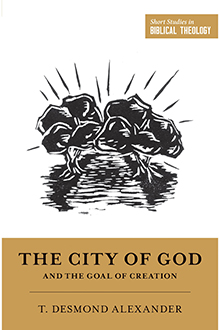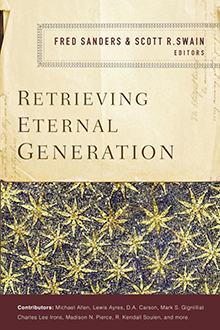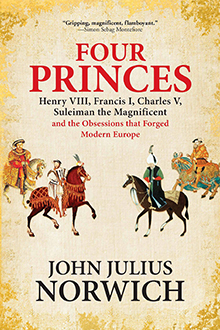 |
 |
 |
 |
The City of God and the Goal of Creation by T. Desmond Alexander (Crossway, 2018, $15.99)
Review by Sarah Haywood
“At the very heart of God’s plan for our world stands an extraordinary city,” T. Desmond Alexander writes. His new book, The City of God and the Goal of Creation, is the latest volume in the Short Studies in Biblical Theology series from Crossway. From the Garden of Eden to New Jerusalem, he explains, the cities of the Bible are linked. And they represent God’s work through history toward the creation of a unique, holy city.
This new city is New Jerusalem, illustrated in Revelation, and “its citizens enjoy an environment transformed by the radiant presence of God himself. … This is a city like no other city.”
Alexander explains how each city, like Babel/Babylon and Jerusalem, displays human desire for authority but points to God’s plan for restoration, to reverse the consequences of sin and the alienation from God that began in the Garden of Eden. In spite of opposition, he says, God will build his holy city: “God and his redeemed people will live together in an extraordinary metropolis.”
Making All Things New: Recovering Joy in the Sexually Broken by David Powlison (Crossway, 2017, $11.99)
Review By Gabriel Reyes-Ordeix
“Both creation and salvation embrace human sexuality. Sex is an elemental good in God’s fruitful work in creation.” But all blessings have been marred by sin, and sexuality was no exception. Our world is filled with sexual brokenness — and so are we. Whether it includes wandering eyes, forbidden romantic attraction, or aggressive flirtation, we are all sexually broken.
This book’s purpose is to highlight God’s grace through Christ and his transforming message to both the transgressor and the victim. Powlison introduces the book with a threefold vision on the Christianity and sexuality: (1) Christian faith revels in sexual fidelity; (2) Christian faith is candid about sexual wrongs; and, (3) the Christian faith brings genuine transformation.
This process of renewal lasts a lifetime. Powlison stresses the importance of knowing the length of the battle: “God works step-by-step. He walks with you. He’s always interested in how you take your very next step. Walking through life with him feels right. You’re going somewhere.”
Making All Things New is a book full of poignant — and often hurtful — truths, but it is also full of the comforting hope that roots itself in the gospel that transforms and sanctifies sinners.
Songs from the Valley by Sandra McCracken (Towhee Music, $6.93 on iTunes)
Review by Matt Damico
Sandra McCracken released her latest album, Songs from the Valley, on Ash Wednesday, a fitting occasion for a collection of laments.
The album fits comfortably in the strain of music McCracken has recently released, with Psalms in 2015 and God’s Highway in 2016. Most of the tracks on this project feature familiarly sparse instrumentation, with acoustic guitar, a few strings, and synthesized rhythm and effects that create a coherent, atmospheric sound across the album. And all the songs, which confess a commitment to the truth in the darkness, are authenticated by McCracken’s weathered, honest voice.
There are moments when melodies sound familiar, but at no point does the album come across as a predictable or as re-hashed material. The lyrics and the development in McCracken’s sound make it fresh.
We’ll never know what the psalms sounded like in ancient Israel. But if David, Asaph, and the Sons of Korah were writing laments today, they might sound a lot like those on Songs from the Valley.
Retrieving Eternal Generation. Editors, Fred Sanders & Scott Swain. (Zondervan 2017, $34.99)
Review by Gabriel Reyes-Ordeix
The christological section of the Niceno-Constantinopolitan Creed (381) is introduced with, “[We believe] in one Lord Jesus Christ, the only Son of God, begotten from the Father before all ages.” The eternal generation of the Son is the doctrine that argues the Son is begotten from the Father in eternity. Since the pro-Nicene trinitarian movement and its resolutions emerged in the fourth century, nearly every ecclesiastical tradition has affirmed the doctrine of eternal generation. Nevertheless, this doctrine has faced increasing challenges in modern times. This becomes one of the big themes of this volume: the necessity to retrieve this foundational truth despite its unstable footing.
The authors describe the doctrine of the Trinity as a constellation of truths — hence, the cover picture. Without the doctrine of eternal generation, these truths are left as big truths of stellar light failing to constellate; they are left shining by themselves, strangely isolated. Eternal generation is defended here as the one doctrine that cements and ties together the array of truths that we call the doctrine of the Trinity. The importance of this doctrine, the editors write, lies in that “It is not enough to say that the Son is God; we must say that he is God the Son, not just God in general … Sonship, or eternal generation, is what gives both form and content to the relation between the Father and the Son … Whenever the nature of the relation is left unspecified, any articulation of Trinitarian theology becomes brittle and disconnected.” Josh Malone, another contributor, writes, “God is a fountain of life, and the church confesses this mystery to entail that the Father begets, the Son is begotten, and the Spirit proceeds … Before all ages, the Father has life in himself and grants the Son life in himself (John 5:26), and in creaturely time the Son gives life to whom he will (John 5:21).”
In an effort to explore and defend this further, Retrieving Eternal Generation makes three cases in detail: that this classic confession is biblically, traditionally, and systematically satisfying. This threefold focus reflects the sections of this book and their approach to eternal generation.
Retrieving Eternal Generation is composed of 15 essays by an array of contributors participating through its three sections. Among them: Charles Lee Irons’ defense of John’s monogenes as “only begotten”, Lewis Ayres on the origins of eternal generation from Origen of Alexandria, Michael Allen on the doctrine after Karl Barth, Keith E. Johnsons’ Augustinian eternal generation, and D.A. Carson on the Crux Interpretum of John 5:26. Other contributors discuss subjects like divine names, Proverbs 8, eternal generation from the Old Testament, the vocabulary used for the doctrine, eternal generation after the reformation, and philosophical and systematic contemporary statements of the doctrine as a conclusion.
Retrieving Eternal Generation is an incredibly helpful compilation of essays on a fundamental and very sensitive subject that comes at a crucial point.
faculty recommendation
Four Princes: Henry VIII, Francis I, Charles V, Suleiman the Magnificent, and the Obsessions that Forged Modern Europe

By the time I read the subtitle of this book, I was already hooked. Why hadn’t anyone written a book like this before? It took John Julius Norwich, a skilled writer and historian, to bring these four great princes who dominated the sixteenth century together into one story. The cast of characters includes sultans and knights, multiple wives and warriors, a series of disastrous popes, and the reformer Martin Luther. Norwich, author of well-regarded books including Byzantium, summons the past and leaves the reader wanting to know even more.




